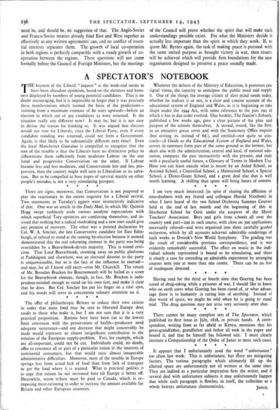The offer of philanthropic Britons to reduce their own rations
in order that more food may be sent to liberated Europe does credit to those who make it, but I am not sure that it is a very practical proposition. Rations here have been • cut to the lowest limit consistent with the preservation of health—producers need adequate sustenance—and any decrease that might conceivably be made would represent an almost insignificant contribution to the solution of the European supply-problem. Fats, for example, which are all-important, could not be cut. Individuals could, no doubt, offer to renounce all or part of a particular ration in the interests of continental consumers, but that would raise almost insuperable administrative difficulties. Moreover, most of the trouble in Europe springs less from actual lack of food than from lack of transport to get the food where it is wanted. What is practical politics is to urge that rations be not increased here till Europe is better off. Meanwhile, warm tribute must be paid to Canada, which is re- imposing meat-rationing in order to increase the amount available for' Britain and other European countries. Whatever the defects of the Ministry of Education, it possesses one signal virtue, the capacity to anticipate the public need and supply it. One of the things the average citizen of alert mind needs today, whether he realises it or not, is a clear and concise account of the educational system of England and Wales, as it is beginning to take shape under the 1944 Act, with some reference to the past out of which it has in due order evolved. One booklet, The Nation's Schools, published a few weeks ago, gave a clear picture of the plan and purpose of the schools themselves. A second, issued, like the first, in an attractive green cover and with the Stationery Office imprint (but costing is. instead of 6d.), and entitled—not quite so con- cisely—A Guide to the Educational System of England and Wales, covers in summary form part of the same ground as the former, but deals also with the administration, central and local, of national edu- cation, compares the past instructively with the present, and ends with a peculiarly useful future, a Glossary of Terms in Modern Use. Here you can learn exactly what is meant by an Aided School, an Assisted School, a Controlled School, a Maintained School, a Special School, a Direct-Grant School, and a great deal else that is well worth learning. A shilling thus spent will bring hours of content.
* * * *


























 Previous page
Previous page